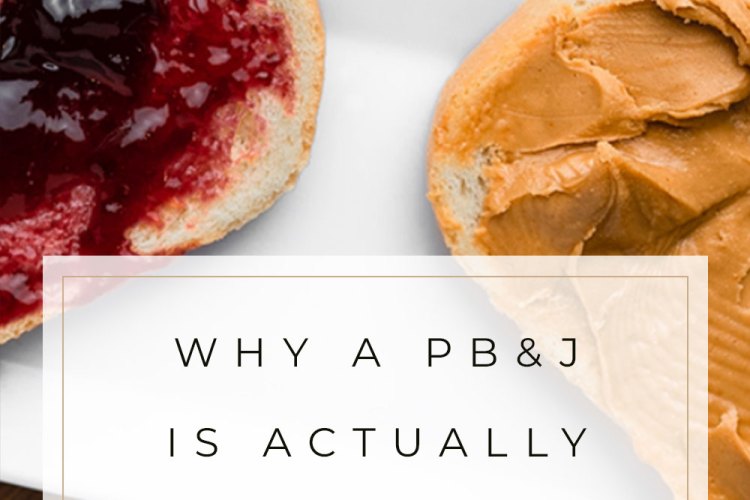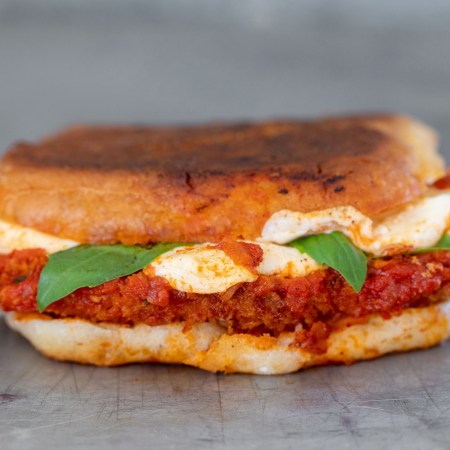About a month ago, I was making a mid-afternoon peanut butter and jelly sandwich in the communal office kitchen when a man I’d never seen before walked by to fetch a Lemon Perrier from the fridge.
This particular gentleman found his Perrier, seemingly decided against grabbing a snack, and made to leave the kitchen. But not before stopping, for just a beat, to watch me spread a liberal amount of peanut butter across a slice of bread. I felt him take in the scene: the Pepperidge Farm Whole Grain Bread, the Boone Maman Preserves Strawberry Jelly, the Smucker’s Natural Peanut Butter … and I could sense that some earth-shattering observation was coming.
“You forgot the chocolate sprinkles!” he said, chuckling.
“Huh?” I looked up.
“Just needs some chocolate sprinkles,” he said again, bemused that I didn’t understand his joke, and then left the kitchen whistling. He was done with me.
I thought about that interaction for the rest of the day. Did he grow up somewhere where people put chocolate sprinkles on PB&Js? Did he mean to say chocolate milk, a drink that might reasonably be paired with a PB&J? And what song was he whistling?
One thing was certain. The man, let’s call him Dave, seemed convinced that in making a peanut butter and jelly, I had crossed some sort of unspoken boundary in the arena of public adult snacking. A PB&J, to Dave, was unreasonable, and deserving of derision. A PB&J was unhealthy, or at least unhealthy enough to be associated with “chocolate sprinkles.” It was childish, too, a relic meant for brown paper bags and scabbed knees and little league games. Instead of grabbing a bag of pretzels, taking a Clif bar, or — if I was really hungry — fixing myself some avocado toast (it’s a well-stocked kitchen), I’d inexplicably reached for a taste of seventh grade. This conclusion tortured Dave even more than his panicked joke, masqueraded as a flippant mic drop, had come to torture me.
Once I reached this understanding, though, a sudden calm washed over me. Dave didn’t know. He’d never been told that PB&Js, under the right circumstances and with the right ingredients, are a viable afternoon snack — especially for fit and healthy adults.
In spring of 2017, ESPN the Magazine published an article titled “The NBA’s Secret Addiction.” It’s the untold story of how peanut butter and jelly sandwiches had steadily become a pre-game ritual around the league. It reads like a scratched-out subplot from Uncut Gems, but it’s all true. Kevin Garnett and the rest of the Finals-winning 2007-2008 Boston Celtics ate them all season long, buoyed by an excellent post-PB&J win at the beginning of the year, and over the ensuing seasons, as players were traded, coaches were released, and strength-and-conditioning coaches compared notes, one team’s superstition became a NBA-wide ordinance.
The Milwaukee Bucks, currently the best team in the league (and for some, in the running for the best of the millennium), reportedly claim the biggest pregame spread. The Golden State Warriors, at the height of their mid-2010s dominance, staged a Steph Curry-led mutiny when upper management tried to take their PB&Js away. And the sandwich might’ve even saved the career of eight-time all-star Dwight Howard; the 6′ 11″ power forward switched to PB&Js after years of Skittles and chocolate bars.
The last point is key: in anointing PB&Js, NBA players didn’t necessarily stumble onto some unknown elixir. Peanut butter, a few scoops of sugary jelly and two loaves of bread isn’t a green smoothie. It can clock in at anywhere from 300 to 500 calories, and when made with white bread (which strips bran and germ), sugar-rich jelly and any brand of peanut butter with more than two ingredients (all you need are peanuts and oil), its nutritional value is dubious. But the sandwich is an undeniable improvement on other snacks these word-class athletes could be eating, be it Doritos, Twinkies or … chocolate sprinkles.
As ESPN‘s article notes, team trainers and physicians have made their peace with the trend. The sandwich has become too important to the players, and besides, the energy these guards and forwards claim to receive isn’t just placebo. Peanut butter, the healthiest constituent of the trifecta, is loaded with protein and healthy unsaturated fats. One of Chris Hemsworth’s nutritionists, an affable, wellness-obsessed Aussie named Dan Churchill, even told us that he carries a jar of peanut butter around throughout the day. The sandwich also contributes to your daily intake of minerals like zinc and iron, and when made with nutty-tasting whole-grain bread (think Ezekiel Bread or Double Fiber Wheat Bread), will help you load up on fiber. The final key? Finding an organic jelly that isn’t as sweet as a can of Arnold Palmer. Most sugar-reduced jams do the trick.
Which brings us back to Dave, wherever he is. I didn’t have a game against the Utah Jazz on the afternoon I made my PB&J a month ago. I wasn’t even headed to the gym after work. But I walked into that kitchen needing a boost to finish an article and bridge the gap to an 8:00 p.m. dinner reservation with friends. Hell, I just needed a boost in general, because we’re all just primates, after all, and if we think too much about why we bang away on metal-plastic monitors for eight hours a day, it’s hard to not want to walk right into the ocean. I made a PB&J, Dave, because that sandwich earned my trust years ago but has never lost my respect. I made a PB&J because it’s healthier than a Pop-Tart and heftier than a piece of toast. I made a PB&J because it makes me feel good for 10 minutes without making me feel bad 10 hours later.
And I still make PB&Js. Sometimes, when the deed is done, and the kitchen is quiet, I’ll stand there and twirl the bread bag around and around, imagining Dave walking in for his Lemon Perrier. I wouldn’t request an apology, or launch into a rant, or toss him a jar of chocolate sprinkles. I would just untie that bread and leave it next to a fresh spoon and knife.
It’s about time you returned home, Dave.
This article was featured in the InsideHook newsletter. Sign up now.



















